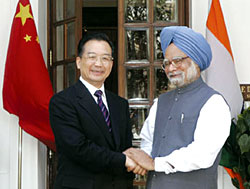 LONDON-The Asia 2015 conference has just reiterated what we have been saying in this space all along: that this is Asia's century. (see 'Action Asia', # 244 and 'Looking East', #252).
LONDON-The Asia 2015 conference has just reiterated what we have been saying in this space all along: that this is Asia's century. (see 'Action Asia', # 244 and 'Looking East', #252). With more than half the world's population, a huge chunk of the global conomy, rising intra-regional trade and a fast expanding consuming class, it deserves the world's focus. However, Asia also counts more poverty and greater disparities between genders, ethnic groups and rural-urban dwellers
so that its major challenge in future decades will be how to ensure inclusive growth.
This century Asia will see India, China and other high-flyers transform themselves from recipients to givers of aid. India refusing aid after the Asian tsunami was a matter of pride--no one likes to be a taker forever. Further, with globalisation investments will largely substitute for aid.
Nepal will remain one of the few Asian recipients over the next 25 years, so we need to get our act together and determine how we can use it for our benefit.
This Beed believes new partnership paradigms are required. For instance, with new ordinances that permit non-profit companies, foundations could be established that include corporations and NGOs so that giving can be sustained over a long period. These corporate foundations could take a leaf from the books of efficiently run businesses and manage aid in a similar manner. This would also help the long term process of substituting foreign aid with the home-grown variety.
If hundreds of Rotarians in Nepal can contribute to becoming Paul Harris fellows, they can certainly set aside money that will not just earn them a pin but directly engage them in the lives of fellow Nepalis. The future of aid will depend greatly on how it is managed. Nepalis have already proven themselves in this sector in places like Bangladesh and with many of our Ivy League graduates aspiring no further than the cubicles of the World Bank or other multilateral agencies. Perhaps this role suits our limited ambitions too. Since our private sector is generally loath to professionalise, by utilising these proven human resources, the aid management business could boom here.
Aid can resume swiftly to Nepal if we can end this political stalemate. Conflict resolution is not a pre-condition to assistance as continued conflict surely will spark further aid experiments but a post-conflict rehabilitation plan would attract the most aid. Our future is laid out in this sequence:
1. Peace
2. End to political deadlock
3. Conflict resolution
4. Rehabilitation
5. Nepal rejoining mainstream Asia
With globalisation, political boundaries do not matter. We may still be Asian due to geography but we could easily be lumped in with the world's most dysfunctional nations because of our own stupidity. It is important that we get a slice of the growth that this continent and especially our giant neighbours are embarking upon.



